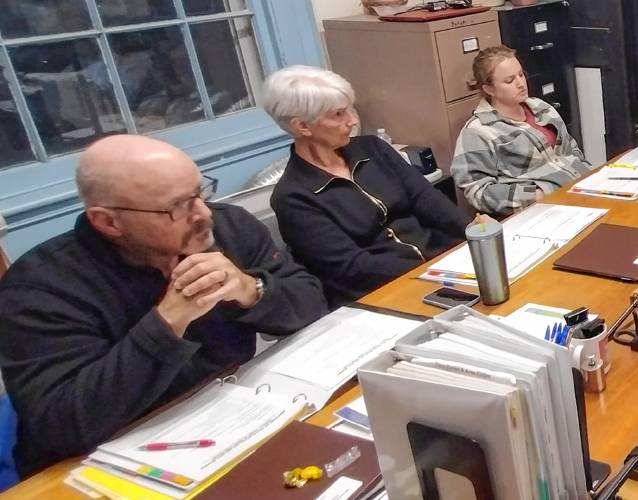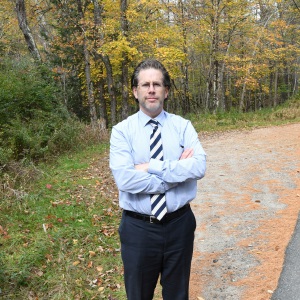Royalston, state police, form service agreement

Royalston Police Chief Curtis Deveneau (not pictured) speaks with the town's Selectboard about the possibility of regionalizing police services with Athol. PHOTO BY GREG VINE
| Published: 03-07-2024 4:53 PM |
ROYALSTON – The town has reached an agreement for assistance from the Massachusetts State Police, but a new plan will needed soon, according to officials.
In the most recent edition of “The Royalston Community Newsletter,” Royalston Police Chief Curtis Deveneu told residents, “We continue to review the best path for our communities’ policing needs as a result of the restrictions placed onto us by the Police Reform Bill, which has had a detrimental effect on smaller communities as it eliminates the training for those who want to serve their community as part-time officers…Our current staffing level has dropped to nine staff.”
Until enactment of police reform in 2020, Royalston’s Police Department had a staff of 19 officers.
Royalston, the only town in Worcester County which still relies solely on part-time officers, recently reached an agreement with the State Police for troopers to assist with law enforcement coverage. State police have previously provided coverage for Royalston during the overnight shift and the agreement will include this as well as the 7 a.m.-3 p.m. and 3-11 p.m. shifts.
The arrangement, however, is not considered a long-term solution to the town’s community policing needs.
In recent weeks, Deveneau has spoken with Athol Police Chief Craig Lundgren about creating an agreement to regionalize the towns’ police departments. The idea has also been brought before Athol Town Manager Shaun Suhoski.
“I think two things need to happen,” Royalston Selectboard Chair Rick Martin said. “I think we need to have a meeting with Athol and talk about it – get a price. Other than say ‘yes,’ we want to look at all the avenues that are available.
“The other thing is we need to have a public meeting. We need to hear from the residents what they expect the Police Department to do in Royalston.”
Article continues after...
Yesterday's Most Read Articles
Deveneau said that his letter explained the department’s role and how it’s been done. But with the changing times, he said expanding is the most reasonable way to continue these services. Martin said that once officials hear from residents, the town will outline the cost for services.
Royalston Selectboard Vice-Chair Deb D’Amico thought Martin and Deveneau should meet with Suhoski and Lundgren.
“I think the two chiefs and you (Martin) and Shaun should sit down so that you have a sense of what is possible so that when you go to the public meeting, you can say, ‘These are the kinds of conversations we’re having,’” D’Amico said.
D’Amico pointed out that towns whose police have regionalized or agreed to share services have gone through a lengthy process, and this can be a challenge for a town with a part-time police. She suggested there may be state grants for a consultant to examine the issues to be addressed prior to reaching an agreement.
“We need a clear sense of what Athol is open to, what it would cost,” said D’Amico. “Then you’ll know what you can go to the public with.”
Deveneau and Martin both expressed agreement with D’Amico’s proposal. Martin pointed out that board member Shelby Bronnes had talked with other communities about the idea of regionalizing and suggested that she should also meet with Suhoski, along with Deveneau and Lundgren.
“Athol’s definitely open to the discussion,” Suhoski told the Athol Daily News. “(Police reform) has had a huge impact on small town police departments. With all the new requirements, it’s making it more difficult for the departments that rely on part-timers to thrive.
“So, we will stand by and wait to hear from Royalston. They’re our partner in the school district, they’re our partner in the regional animal control services, and we have an inter-municipal agreement with them for operation of their sewage treatment plant. It’s basically a matter of being efficient and responsive to the taxpayers.”
Greg Vine can be reached at gvineadn@gmail.com.

 1989 homicide victim found in Warwick ID’d through genetic testing, but some mysteries remain
1989 homicide victim found in Warwick ID’d through genetic testing, but some mysteries remain Upon review, panel not behind any ballot questions
Upon review, panel not behind any ballot questions Sportsman’s Corner: Orange Gun Club’s Kids Derby
Sportsman’s Corner: Orange Gun Club’s Kids Derby DA to announce breakthrough in 1989 unsolved homicide
DA to announce breakthrough in 1989 unsolved homicide